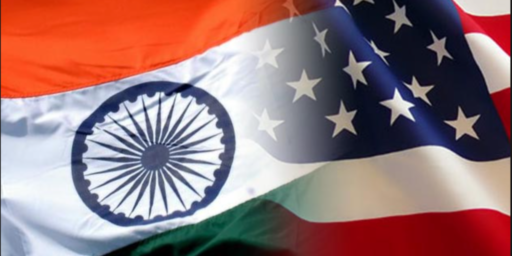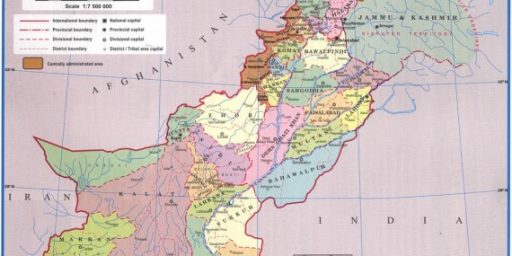Kissinger on Afghanistan: More Troops
While the debate over Gen. McChrystal’s recent comments to which James referred yesterday continues to rage, former Secretary of State Henry Kissinger has entered the lists in the policy battle over the strategy in Afghanistan:
The request for additional forces by the U.S. commander in Afghanistan, Gen. Stanley McChrystal, poses cruel dilemmas for President Obama. If he refuses the recommendation and General McChrystal’s argument that his forces are inadequate for the mission, Obama will be blamed for the dramatic consequences. If he accepts the recommendation, his opponents may come to describe it, at least in part, as Obama’s war. If he compromises, he may fall between all stools—too little to make progress, too much to still controversy. And he must make the choice on the basis of assessments he cannot prove when he makes them.
He comes down along the lines that have been proposed by Gens. McChrystal and Petraeus:
President Obama, as a candidate, proclaimed Afghanistan a necessary war. As president, he has shown considerable courage in implementing his promise to increase our forces in Afghanistan and to pursue the war more energetically. A sudden reversal of American policy would fundamentally affect domestic stability in Pakistan by freeing the Qaeda forces along the Afghan border for even deeper incursions into Pakistan, threatening domestic chaos. It would raise the most serious questions about American steadiness in India, the probable target should a collapse in Afghanistan give jihad an even greater impetus. In short, the reversal of a process introduced with sweeping visions by two administrations may lead to chaos, ultimately deeper American involvement, and loss of confidence in American reliability. The prospects of world order will be greatly affected by whether our strategy comes to be perceived as a retreat from the region, or a more effective way to sustain it.
He also urges a political offensive within Afghanistan, cultivating regional even local authorities, and a diplomatic offensive, an effort to get all of the major powers that border Afghanistan pulling the same way:
In a partly feudal, multiethnic society, fundamental social reform is a long process, perhaps unrelatable to the rhythm of our electoral processes. For the foreseeable future, the control from Kabul may be tenuous and its structure less than ideal. More emphasis needs to be given to regional efforts and regional militia. This would also enhance our political flexibility. A major effort is needed to encourage such an evolution.
Concurrently, a serious diplomatic effort is needed to address the major anomaly of the Afghan war. In all previous American ground-combat efforts, once the decision was taken, there was no alternative to America’s leading the effort; no other country had the combination of resources or national interest required. The special aspect of Afghanistan is that it has powerful neighbors or near neighbors—Pakistan, India, China, Russia, Iran. Each is threatened in one way or another and, in many respects, more than we are by the emergence of a base for international terrorism: Pakistan by Al Qaeda; India by general jihadism and specific terror groups; China by fundamentalist Shiite jihadists in Xinjiang; Russia by unrest in the Muslim south; even Iran by the fundamentalist Sunni Taliban. Each has substantial capacities for defending its interests. Each has chosen, so far, to stand more or less aloof.
The summit of neighboring (or near-neighboring) countries proposed by the secretary of state could, together with NATO allies, begin to deal with this anomaly. It should seek an international commitment to an enforced nonterrorist Afghanistan, much as countries were neutralized by international agreement when Europe dominated world affairs.
While I agree completely with the position that James articulated in his post, I would only add that I would hope that President Obama might arrive at his decision on how to proceed in Afghanistan and state that position unambiguously soon. Politics, like nature, abhors a vacuum and the current ambiguity over the future direction of our policy in Afghanistan creates an opening for generals, politicians, and former secretaries of state to attempt to influence the direction of that policy. The situation in Afghanistan is probably as well understood now as it is likely to become and little good will come of further delay.






Anti war people (Obama’s base) want us out of Afghanistan. They claimed it was the right war only to bash Bush for Iraq. Those who say Bush did nothing in Afghanistan should notice the Taliban is not in charge in Kabul. They once were. If Obama leaves this fight and al Qaedq reestablishes itself in Afghanistan. We will be attacked again. That will be on this Presidents head.
The administration already made it clear that pulling out is not an option, so I’m not sure why Zelsdorf is even discussing that.
Obama doesn’t make quick decisions. In the rare cases when he does, he often makes a mistake. The slow and steady approach is what many admired during his campaign: there was no overreaction when the Wright story came out or when Hillary swept a few primaries. So I’m just saying, this is what the American people asked for. Hopefully his deliberate decision will be a good one.
And if we get the multi decade long plan for Afghanistan that many are suggesting, the cost will be similar too. Just not the benefit to Americans.
I agree with HAK that more effort needs to be made at the local level rather than the national government. Unfortunately, Hilary decided last week that the U.S. will go with Karzai the whole way. Not because it’s the right thing to do, but because it’s less complicated.
Under Karzai what we find is that the more the U.S. gets involved in the Afghan War, the less our Afghan allies will do, preferring to skim more and more off the top for themselves and let the Americans shoulder more and more of the political, economic, and military burden. We’ve seen it politically, when Karzai sabotaged the election; we’ve seen it militarily, when Afghan soldiers assigned to work with U.S. forces declare that they will do nothing because they’ve been told they’re “on vacation”; we’ve seen it economically, through the revival of the drug lords.
So wherever the U.S. withdraws its forces a vacuum is left behind that the Taliban and its allies can fill.
We will never win in Afghanistan unless we commit sufficient forces to subdue the country until such a time as Islam evolves into a civilized religion. I’m guessing that would take on the order of 700 to 1,400 years, but then I’m usually over optimistic about human nature.
Kernel of truth there, d’Inger.